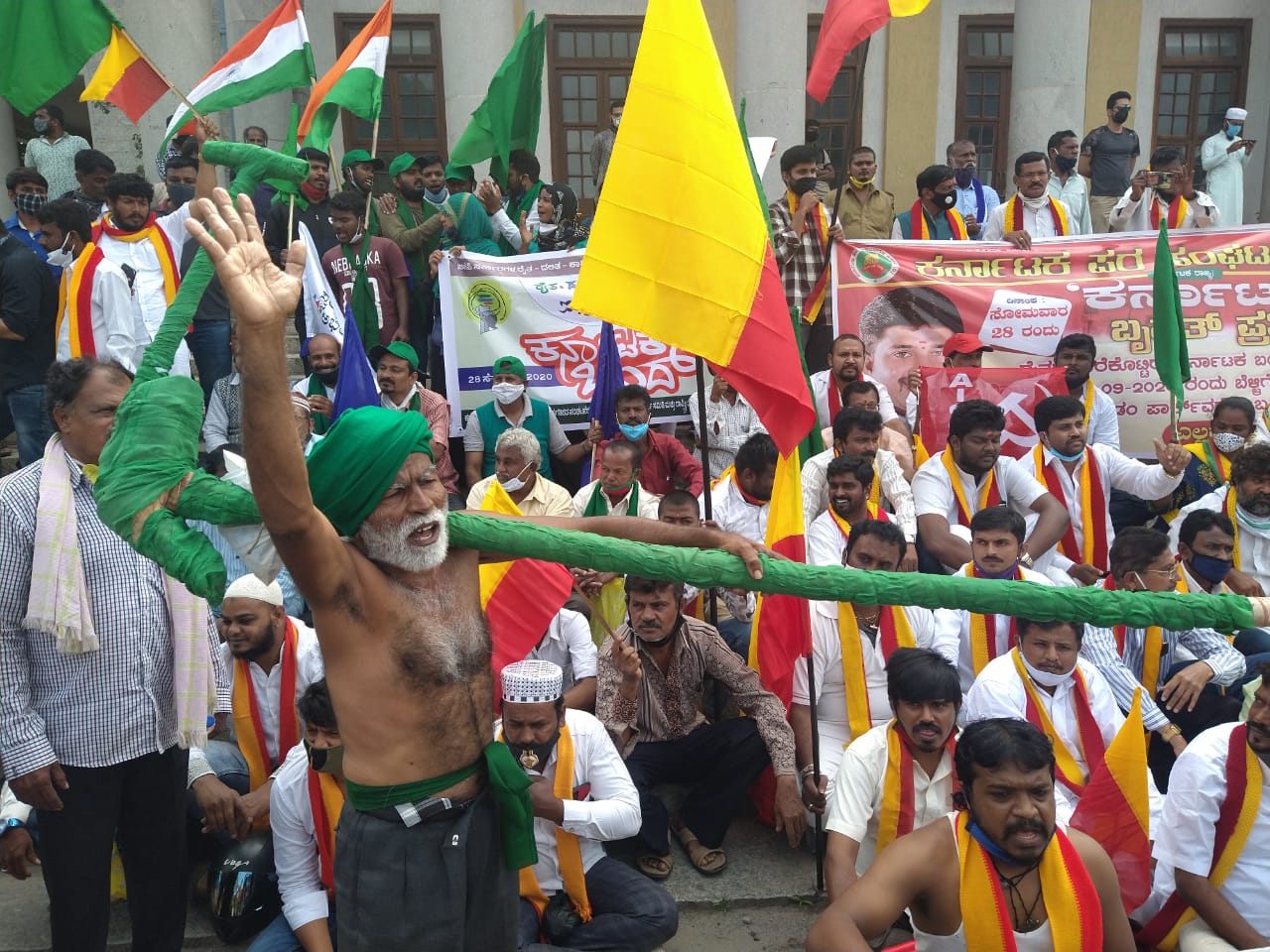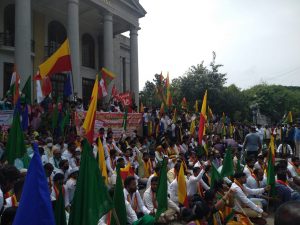
Farmers in Cauvery belt irked as agri bills silent on support price
Farmers in Karnataka’s Cauvery belt are riled up over the amendments as they are silent on minimum support price and have removed cereals, including rice, from the essential commodities’ list.

The Karnataka bandh called on Monday by farmers, trade unions and other support organisations over the amendment to farm legislations by the Centre and the state evoked mixed response.
Farmers in Karnataka’s Cauvery belt, in particular, are riled up over the amendments as they are silent on minimum support price and have removed cereals, including rice, from the essential commodities’ list. This, they fear, would impact the two water-intensive crops sugarcane and paddy, for which the government has been offering MSPs.
Amid a walkout by the opposition Congress, the state on September 26 amended the Agricultural Produce Marketing Committee (APMC) Act to allow private players to directly approach farmers to purchase agricultural produce. The law doesn’t require the buyers to adhere to the MSP.
Related News: Prez Kovind gives nod to all 3 farm bills amid protests by farmers
Even as many farmers across the state took to the streets, there were some who stayed away from the protests as the agriculture season is at its peak.
N.P. Janardhan, a farmer in Naganahalli in Mysore, who grows paddy during kharif and vegetables during the rabi season in his 4.5 acres of land, did not take part in the agitation. He, however, said the government’s move will hurt farmers as they will be “exploited” by rice mill owners.
Explaining the problem on ground, Janardhan said even if he is allowed to sell his produce to anyone, he cannot go beyond his reach and travel to a distant place to sell his produce.
“Let us say tomorrow the commanding price for my vegetable is more in Kerala than in Karnataka. I will have to transport it all the way to a different state and, if the buyer fails to buy it, I cannot afford to bring it back as it increases my cost beyond the market value,” he said. “Secondly, I cannot keep perishable goods for long and I will not be able to negotiate a price if they age. So, I may end up making a distress sale.”
It is not just perishable goods, he said he will face problems with cereal crops, too. According to him, he was being subjected to exploitation even before the farm bills were passed, and now he feared he would be further pushed to a corner.

“The government purchases 25 quintals of rice from my farm. But, my harvest is about 40 quintals. I sell the 25 quintals at ₹1,800 a quintal. But the balance 15 quintals that I am allowed to sell to outsiders fetch prices that are below the MSP,” he said.
Related News: Farm bills to impact food security, PDS, fears Bengal govt
He said rice mills pay him ₹1,300 per quintal against the MSP of ₹1,800. “I sell it at a loss of ₹500 per quintal as the government does not buy it from me and the private parties refuse to increase the rates,” he said. “And I cannot afford to keep the stock as I need the money for the next crop season. So I end up losing Rs 500 per quintal.”
He said the problem is compounded by the government not paying on time. If the government paid him promptly, he would be able to store the paddy and wait for a good price. Since the mills assure him money immediately, he prefers to sell them more at times, he said.
With cereals being removed from the essential commodities’ list, Janardhan fears traders will hoard the goods to bring down the price they have to pay farmers and tweak the market dynamics.
Several farmers, who came to the farmers’ rally in Bengaluru to protest against the government, aired similar views.
Related News: Withdraw farm bills or kill us directly: Farmers
Even though the Prime Minister Narendra Modi-led government announced ₹2,000 per quarter as income support to farmers under the PM Kisan programme and Chief Minister B S Yediyurappa topped it up with another ₹2,000, Janardhan said it is not of much use. “What is the point of giving us money when they are increasing the cost of fertilisers, seeds and petrol price? They put money on one hand but take tripe that amount from the other.”
Like paddy farmers, those cultivating sugarcane are also worried. Mandya is one of the largest sugarcane producing districts in Karnataka. At present, there are four sugar mills in the district; another one is defunct. Farmers said every year, they are at the mercy of sugar mills to sell their produce. If the crop doesn’t get sold on time, they take it to jaggery units and sell it at 40 per cent lower price.
The government, over the years, has been stressing on the need to move away from water-intensive crops like paddy and sugarcane to other crops like ragi, jowar and corn. Farmers, however, stick to these two crops as the MSP for them is fixed, unlike for other crops.
With the new amendments, they fear the crops in the Cauvery belt will get affected and they will be subjected to further exploitation.
Kurubur Shantakumar, a farmer leader who is a part of the Karnataka Sugarcane Growers’ Association, said the government could have consulted them before passing such controversial bills. “What was the need for the government to take the ordinance route? Why couldn’t they have discussed the bills with farmers, debated them in the Assembly and then passed the amendments if there was consensus?”
Related News: Watershed moment in history of agriculture: PM on passage of farm bills
Chief Minister B.S. Yediyurappa on Monday (September 28) said he would a door-to-door campaign to explain the “positive” aspects of the amendments. Shantakumar, too, vowed to do a similar campaign to educate farmers about the drawbacks.
“I request all farmer leaders to come and sit again with me to discuss. The government is ready to make any change the farmers feel is right,” Yediyurappa said on Monday. However, even as the government held a meeting on September 25, the farm leaders alleged that the government was not willing to listen to them. “What is the point of calling meetings if they are not willing to listen to our viewpoints?,” Shantakumar asked.
Not all believe the amendments are bad. Rajendra Hegde, a farmer and an agri-scientist, said that while he did not approve of the way the ruling dispensation passed the amendments, the changes are aimed at helping farmers in the long run, at least those who produce non-perishable goods.
He said he along with seven friends from non-agriculture background cultivated sesame in about five acres of land. They were offered half the market price for the best-grade quantity at the APMC yard in the Sathanur market. He said he did not sell his produce. He was holding the stock to improve its quality/grade by cleaning it up so as to fetch a better price. He said he will wait till he finds a buyer who can pay him the price he wants.
Related News: Farm bills: BJP’s oldest ally Shiromani Akali Dal quits alliance
He said arecanut crop too had a similar problem. Buyers offered him Rs 17,000 per quintal, but he is waiting for someone to pay him ₹22,000. He said he wouldn’t mind waiting for a few more months to sell his produce at the price he desires.
“Farmers who grow arecanut, cocoa, banana, nutmeg and other crops have suffered at the hands of traders in the APMC yards. That needs to change. Farmers can stock their non-perishable produce to command a better price by improving the quality and by not succumbing to the pressure from traders at APMCs,” he said. “The purpose of the Act may get diluted when it is implemented. But, for now, it aims at bringing positive changes and empowering farmers.”


